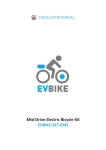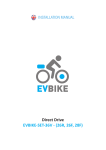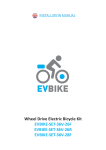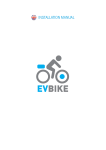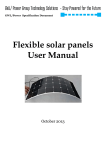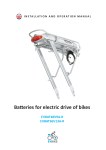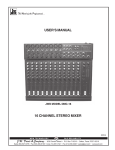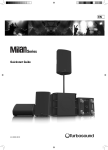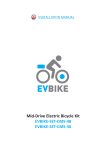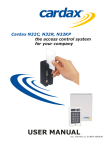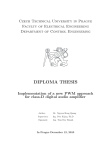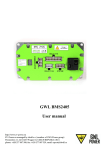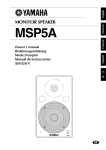Download INSTALLATION MANUAL - Elektrokola eVelo Pardubice
Transcript
INSTALLATION MANUAL EV-POWER.EU (GWL/Power group) i4wifi a.s., Průmyslová 11, 102 19 Prague 10 Phone.: +420 277 007 500, Fax: +420 277 007 529 e-mail: [email protected] http://www.evpower.eu INSTALLATION MANUAL Dear Customer, Congratulations on purchasing your EV-BIKE, we believe you will be fully satisfied. The electric bike is one of the most economical types of transport with minimal operating costs. Mounting kit EVBIKE is intended as conversion kit of your existing bike to the bike with electric drive. EV-BIKE set is compatible with almost every mass-produced bike. We rocommend you before installation consult compatibility and extent of adjustments with your nearest EVBIKE service partner. The up to date list of the partners can be found on the website www.evbike.cz in "Partners" section. Most bicycles is designed for a maximum load up to 120 kg (weight of the rider, bike and accessories). EVBIKE set is also designed for such load. In case of exceeding weight limit, it is necessary to select rim with spokes designed for higher load. Information about special rim will provide you our your service partners. In rare cases it could happen that you do not like purchased product, or you have found fact in the assembly manual that would prevent you from using EVBIKE kit, please return back EVBIKE kit before installing in the original packaging. For the current warranty conditions and the possibility of returning, please contact your dealer who will advise you on how to proceed. We wish you many happy kilometers! EVBIKE SET IS SOLD AS A KIT. FOR SAFETY AND COMPLIANCE WITH LEGISLATIVE REQUIREMENTS, THE FINAL PRODUCT IS FULLY GUARANTEED BY THE BIKE OPERATOR OR WHOEVER ASSEMBLED AND SOLD THE BIKE. WE RECOMMEND ENTRUST THE INSTALLATION TO A PROFFESIONAL BIKE SERVICE. PLEASE CAREFULLY READ THIS INSTALLATION MANUAL BEFORE YOU START THE EVBIKE CONVERSION. 2 INSTALLATION MANUAL TABLE OF CONTENTS 1. Changing of rim with motor ......................................................................................... page 5 2. Pedal assistant ........................................................................................................... page 7 3. Controller and cabling .................................................................................................. page 8 4. LCD panel instalation ................................................................................................... page 9 5. Brakes, accelerator, handle ........................................................................................... page 11 6. Battery installation ..................................................................................................... page 12 7. Charging .................................................................................................................... page 15 SPECIFICATIONS ● Motor power: up to 500 W / 36 V (limited to 250 W)* ● Motor weight: 6,6 Kg ● Maximum speed: up to 40 km/h with pedal assistence (limited to 25 km/h)* ● Driving range: 30 - 70 km - depending on pedalling intensity, nature of the terrain and used battery type ● Size and material of rim: 26" or 28" x 1,75", Alluminium alloy 6061, (double wall) ● Maximum rim load: 50 - 70 kg, total bicycle load up to 120 kg must not be exceeded (includes the weight of the rider, bike and EVBIKE set) ● Drive: front/rear ● Battery types: Lithium 36 V, capacities 10 Ah, 7 Ah and 6 Ah ● Battery Weight: 4,8 kg (10 Ah), 3,1 kg (7 Ah) and 3,6 kg (6 Ah) * Due to European laws for electric bikes, maximum speed is limited to 25 km/h. The limitation can be set off for running at private roads etc. 3 INSTALLATION MANUAL KIT FOR CONVERSION OF BIKE TO ELECTRIC BIKE (EV BIKE) EVBike is one of the cheapest vehicles with minimal running costs. This assembly pack is meant for conversion of your current bike to electric bike. EVBIKE HUB motor LCD display Pedal assistant Sensor Sensor Magnet Brake levers Magnet Accelerator Battery Controll unit For succesful assembly of EVBike, you will also need following: ● ● ● ● ● strip belts (to hold cables) screws, nuts, washers usual assembly tools special bottom bracket tools (Fig. 1a - 1c) basic technical skills a b c 1 4 INSTALLATION MANUAL DETAILED MANUAL 1. Installing EVIBIKE HUB motor ● Remove the original wheel and swap tire to the EVBIKE HUB motor rim. ● Insert the EVBIKE HUB motor into the fork. When installing, make sure the correct direction of rotation. The cable come out on right side of the fork when bike is in the normal position. Otherwise the wheel will run backwards against direction of way. 2 ● 3 Mounting of the rim differs bike to bike. For all bike types we recommend to use the torque arm. See Figures 2, 4, 5. The torque arm will eliminate the reaction torque on axe (Fig. 6). Torque arm is partof the optional accessories and is not included in basic package. 4 5 5 INSTALLATION MANUAL Direction of engine torque Reaction torque on axle Axle spinout and spread dropouts Example of torque arm installation 6 CAUTION In any case, it is necessary to ensure tight connection nuts, washers and fork surface. Insufficient nut tightening may cause wheel dropping out of the fork. The connection between wheel and fork must be firm and stable (Fig. 7). Fork Nut Motor Engine shaft spring washer (not included) 7 8 NOTICE When you install the hub motor to the rear wheel (Fig. 8), proceed the same way. There are only following differences between front and rear wheel installation. ● In addition, you must dismount the freewheel shimano gears. To dismount the freewheel use a special pinion puller (Fig. 1b). The rear hub motor is ready for mounting freewheel with screw pinion. For most bikes equipped with 7 gears shimano wheel is a screw pinion. For bikes with 8 gears or more gears is not recommended to use the rear hub motor because here is a potential of many complications during the installation. For bikes with 8 and more gears we recommend to use the front wheel hub motor. ● The cable come out on left side of rear fork when the bike is in normal position. ● After installation the hub motor you will need to adjust the sorting of gears. Its needed to avoid a collision with the hub motor. 6 INSTALLATION MANUAL 2. Pedal assistant ● When you start pedal, the pedal assistant will automatically adjust motor power. ● To install this part, you have to remove spindle. Removing requires special tools (Fig. 1a, 1c). ● Disassemble the bike parts as shown at the Fig. 9. ● Mout plastic wheel with magnets in correct direction of rotation (shown on wheel by arrows). pedal pedal assistant plastic wheel with magnets pedal assistant sensor bike frame Crankset spindle removable ring 9 ● There must be about 2-5 mm space between plastic wheel and sensor. Depending on the type of bicycle, the distance between the magnet wheel and sensor could be too small respectively large. Sensor ring sleeve can be rotated and sensor bolted from the other side (Fig. 10). 2-5 mm 2-5 mm 10 ● Assembly all parts back. Before final tightening you should check the correct function of pedaling detection. TIP If you mount kit on a scooter, or operate it only in accelerator mode, you can skip pedal assistant assembly. 7 INSTALLATION MANUAL 3. Controller and cabling Main wire for control elements (LCD display, brakes, accelerator) Speed sensor Pedal assistant Battery power 11 Motor connector WARNING Make sure proper cable connection! Conectors have different colors so risk of incorrect connection is minimised (Fig. 11). In addition, they have locks against turn over. Use adequate strength to connect connectors. If you use excessive force, you may damage the connectors! Before connecting cables to the controller, make sure that all the pins inside the connectors are properly seated. All pins must be in straight direction to the opposite connector body. Before cable connecting, check the contacts and make adjustments to ensure perfect contact pins with the opposite connector pins. Wrong cables or pins connecting can cause serious damage of bike parts - especially the battery, motor and controller. Damages due the incorrect cable or pins connecting will void your warranty When connecting the motor connector and controller, make sure that the arrows on the connectors facing each other (Fig. 13). brake accelerator LCD display brake 12 13 8 INSTALLATION MANUAL 4. LCD panel installation Sensor LCD display Magnet Control buttons 14 15 4.1. Installation of the LCD panel to the handlebar The LCD panel (Fig. 14) can be installed on both sides of the handlebar (left or right). Please have in mind the correct position of buttons – the lettering "MODE" must be read from the perspective of the rider. After installation of the LCD panel please connect cable to the control unit. 16 2-5 mm 17 4.2. Installation the wheel speed sensor Speed sensor (Fig. 15) must be installed as near to the control unit. In most cases this will be to the rear wheel. Sensor attach to the frame. Magnet must be installed close to the speed sensor. The optimal distance between the magnet and the speed sensor is about 5 mm. (Fig. 17) If the display does not show information about speed and distance, the error is in the installation of speed sensor. NOTICE If the speed sensor or magnet are not installed correctly EVBIKE set turns off automatically 10 minutes after startup. 9 INSTALLATION MANUAL THE LCD PANEL IS FULLY FACTORY CONFIGURED TO MEET THE LEGISLATIVE REQUIREMENTS OF THE E-BIKES. SPEED IS REDUCED TO 25 KM/H AND ENGINE POWER TO 250W. TIMER BATTERY VOLTAGE INDICATOR The battery indicator shows the approximate value of the voltage, not the capacity of the battery! When driving, battery voltage changes and indicator can show a fully discharged battery. This is a normal phenomenon which depends on type of the battery. For the real status of the battery voltage is necessary to stop the bike. SPEED POWER ASSIST UP TO 6 KM/H (WALK) 18 POWER LEVEL DISTANCE 4.3. Basic information about using the LCD panel The panel displays driving information such as battery status. Displays the current, maximum and average speed. Stores information about daily and total distance driven. The default rim size is 26 ". LCD panel communicates with the controller. The panel allows changing the power level in 5 steps. You can change the power level by pressing the buttons "UP" and "DOWN". Longer holding the button "DOWN" will activate engine speed of 6 km/h. This feature can be used to start the EVBIKE in case you have not installed accelerator (throttle). The panel's backlight can be activated by simultaneously pressing buttons "UP" and "MODE" for 3 seconds. Long press "UP" button to toggle current, maximum and average speed. Short press "MODE" button to switch daily (TRIP) and total distance driven (ODO). Daily kilometers (TRIP) is always reset when you turn off the display. Total kilometers (ODO) remain in the memory of LCD panel. For detailed setup and use of the LCD panel, search for interactive tutorial at www.evbike.cz in "Operating the computer" section. NOTICE Activation of the LCD panel is required to operate the bike. After switching on the battery, press and hold the "MODE" button that will display information on the LCD panel and the bike can be used. If you set engine power level to 0, the pedal assistant is inactive. 10 INSTALLATION MANUAL 5. Brakes, accelerator, handle ● First disassemble the original equipment. ● Controls assemble in this order see Figure 19. Accelerator and LCD can be installed on left or right side according to user preference. brake brake ring spacer LCD display handle accelerator LCD controller shorten handle handlebar 19 20 NOTICE If you operate bike in pedal assistant mode you can skip the installation of accelerator. Unused connector on the combined wiring harness must be insulated against moisture. 11 INSTALLATION MANUAL 6a. Battery installation - battery on the bike frame A B 21 22 ● To connect the battery to the controller you must loosen screws of two-piece cover (A and B, Fig. 22) on the bottom of the battery holder, connect the connectors and tighten them sufficiently (Fig. 23, 24). Screw connector cover back. ● All screws must be tightened sufficiently to avoid the transient resistance effect when discharging (C, D, Fig. 23). This effect can cause the battery deep discharge, short circuit or damage to the material due to excessive temperatures. Screws tighten with adequate force to prevent damage of the battery terminals. ● Battery holder is mounted into the holes on the bike frame designed for mounting bottle cage (Fig. 21). C D 23 ● 24 Finally, insert the battery into the holder and lock key. Please pay attention to the right and gently fitting the battery into the holder - ensures long life of the latch mechanism. Putting into operation The battery is put into operation by switching the green button located on the bottom right of the battery holder (fig. 21). 12 INSTALLATION MANUAL 6b. Battery installation - battery on carrier 27 25 A B C 26 28 ● For battery holder assembly, you need 4 pcs of M8 screws including pads and nuts. Lenght of screws depends on your bike construction. These screws aren’t part of package. ● Fasten the lower spacer rods to carrier (Fig. 27). Rods allow set carrier to the three differnt positions (Fig. 26). Select the optimal height to have carrier in horizontal position. (Bolts aren't included in basic package). ● Attach the rods to the bike frame using holes next to the chainrings cartridge (Fig. 28). 29 30 ● Use Curved rods (Fig. 27) to attach carrier to bike frame under the seat. Use the supplied screws and lock nuts (Fig. 29). ● Choose correct distance and fix the rods to carrier using provided screws (Fig. 30). ● When the carrier is attached to bike frame, attach the battery. 13 INSTALLATION MANUAL 6c. 10 Ah battery power switch Default position of ignitor is UNLOCK. Turn the possition to PUSH and push the key inside. There is a lock at the bottom of battery, which lock battery to the carrier. Then turn to OFF and right after to ON. Now the battery is locked to the carrier and system is powered (Fig. 31). ON UNLOCK OFF 31 WARNING In case that your next ride will be longer than an hour always put the key in the OFF position. In case that EVBIKE is not used for more than 24 hours, recharge the battery to full capacity, remove it and store in a dry place. This warning applies to all battery types. 14 INSTALLATION MANUAL 7. Charging Proper charging Lithium cells which contain EVBIKE batteries can be recharged at any level of charge or discharge - these batteries have no memory effect. We recommend always after the ride, or during of extended ride pause to recharge the battery so you can immediately enjoy full power and a long driving range. After recharge always unplug the battery from the charger. Before using, let it to cool down (about 30 min). ● Current state of charging is indicated by LED color lights on charger. RED – charging in progress. GREEN – charging finished (charger is now disconnected from battery). ● The charging time is 3-6 hours depending on battery condition. EVBIKE set is equipped with a light energy recovery. Energy recovery works eg. when a speed is 30 km/h downhill, motor automatically starts to generate power and recharge the battery. Driving at this speed must be at least 10 sec. Energy recovery is reflected on the LCD display by battery voltage indicator. It shows full charge status. The motor puts a slight resistance and sounds like when driving. Bike then not accelerating, nor slowing down. Brake Energy Regeneration in the common terrain can return to about 5% of the energy. Proper discharging Recharge the battery to full capacity after the the first disconnection of protective controller. Never try to reuse the battery after protective disconnection! Deep discharge of some cells and their unrepairable damage may happen! Such battery usage may also cause unbalance of battery cells voltage and decrease their capacity. In extreme cases, the battery can not be recharged again. This kind of damage can be easily diagnosed and will result in avoiding your warranty. Balance charging Inside the battery is an electronic battery protection - balance circuit (compensates the voltage of the cells to the same value). When using the battery cells voltage is always softly unblanced and we recommend after about 8-10 charging cycles to leave the battery on the charger even after charging is completed. The battery is still charged by a small maintenance current flow and balance circuit equals the voltage of cells to the same level. Therefore double the charge time compared to standard time. Do not perform balance charging every time you recharging the battery. It may shorten service life of the battery cells. We recommend balance charging especialy before first ride and always, if you suppose that the battery has not its standard power! TIP The first time charging, we recommend charging four hours longer, even if the light is green. There is a battery cell balancing. 15 INSTALLATION MANUAL Storage If you do not use the bike for more than 1 hour, always disconnect the battery using its power switch. If you do not use the bike for more than 24 hours, always remove the battery, recharge it and store in a safe dry place at room temperature. Beware of short-circuit the battery terminals (contacts) when storing and handling. For long-term storage, such as off-season, it is also necessary check battery every 14 days (using LEDs) and after 1 month recharge the battery to its full capacity. If you do not perform this maintenance deep discharge of the battery cells will occur. This irreparable battery damage is not covered by warranty. WARNINGS FOR BATTERY USE - POSSIBLE DANGERS Danger of shortcut and follwing fire Charged or uncharged cells contains a high amount of electric power, it may cause a electric sparks when contacts are in shortcut. Batteries are not flammable, but fire may be created from sparks or high temperature connectors (temperature caused by shortcut). Danger of injury caused by DC current When connecting more cells or batteries to serie, the danger of injury increases. Never touch the electric wires or other componnents that are powered. Chemical material danger Lithium cells and batteries does not contain any caustics or acids. Still materials that are affecting human body are inside. We recommend you to use following guidelines when manipulating with Lithium cells. • Eye protection: use eyewear to prevent intrusion of any chemicals in eye. • Skin protection: use protection clothing and gloves. Prevent contact of chemicals with your skin. • Inhale protection: Manipulate with cells or batteries only in ventilated areas. 16 INSTALLATION MANUAL End user instructions Batteries and cells can be used only by person, instructed to use Lithium batteries and cells. This nstruction is done by last reseller. When the batteries are sold and shipped, instruction is done via enclosed manual, more details to be found at reseller website. Warnings Protect against unqualified manipulation, protect against kids. Protect against water or other liquids. Use the batteries with control or constant managment of Battery protection/control system. Protect the cells and batteries against overcharge and deep discharge. Don’t brake battery case, don’t manipulate with damaged batteries. Battery and cell recyclation – legal obligation informations a) Of the manner of re-collection; for this purpose, the seller publishes actual list of affordable way to take back and separated collect. Including at least name of the place and address. Place to take back and separated collection: i4wifi a.s., Průmyslova 11, Praha 10 b) About possible negative effects of materials used in batteries or accumulators to environment and human health. Batteries and cells contain chemical materials that have negative effect on environment and human health. c) About meaning of graphical symbol for separated colletion or take back and about meaning of markings THIS IS GRAPHICAL SYMBOL FOR SEPARATED COLLECT OR TAKE BACK. DO NOT PUT BATTERIES TO MUNICIPAL WASTE BUT HANDLE THEM IN PLACE FOR SEPARATED COLLECT OR TAKE BACK. BEFORE THE FIRST RIDE CHECK THE TIGHTNESS OF ALL BOLTS AND FUNCTIONALITY OF ALL SYSTEMS INCLUDING WHEEL BRAKES. Global World Logistic Ltd.,EU-VAT ID: CZ682998344, as legal entity authorized by manufacturer for EU, hereby declares, that the device is in compliance with basic requirements and further relevant provisions of directive LOW VOLTAGE DIRECTIVE 2006/95/EC which sets technical requirements for electric devices of low voltage. This declaration is issued on documents provided by Manufacturer. 17



















